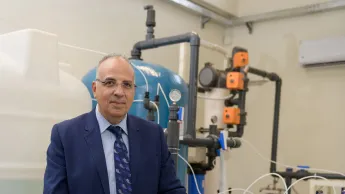From sunlight to water to food
- 2022-12-19
- Bettina Mittelstraß
- Comments

There is abundant sunlight in the Mediterranean region. It can even be used for desalination of Mediterranean seawater when it is converted into electrical energy. The desalinated water then flows into the production of fish and crops. The by-product of desalination – the brine – is used in the cultivation of algae and aquatic crustaceans. These in turn are used in fish farming and thus ultimately feed people.
Professor Hani Sewilam, Egyptian Minister of Water Resources and Irrigation since September 2022, developed this innovative model in collaboration with a multidisciplinary team in the Center for Applied Research on the Environment and Sustainability (CARES) at the American University in Cairo (AUC). The key aspect of the system is that it creates no waste, and has no negative impacts on the ecosystem. ‘Instead our approach enables the extraction of six products from sunlight and seawater. This can guarantee water and food security in many countries’, he says.
These synergy effects resulted in the DAAD alumnus being presented with the WEFE (water, energy, food and ecosystems) Nexus Award at this year’s COP27 climate conference in Sharm El-Sheikh. This award is announced annually by the EU-funded Partnership for Research and Innovation in the Mediterranean Area (PRIMA).
A model with far-reaching potential
‘This award is a seal of approval for the model we have developed. It has the potential to change the image of the water and agriculture sector, not only in this country’, Sewilam says. The zero-waste model that prevailed against 18 other projects submitted from Mediterranean countries is also said to have positive socio-economic impacts: it could create jobs and increase the capacity of small-scale agriculture, and 75 per cent of local materials could be used in implementing the model. ‘The overall implementation could become a new project in my Ministry involving collaboration with the private sector and the AUC’, the Egyptian Minister reports. ‘I want to expedite desalination using solar energy to extract future water resources.’
Hani Sewilam, who was awarded his doctorate with a DAAD scholarship at RWTH Aachen University, is now not only involved as a professor at the AUC Institute of Global Health and Human Ecology and director of CARES, but is also active at RWTH as a water expert teaching and conducting research into engineering hydrology. He is also managing director of the UNESCO Chair for Hydrological Change and Water Resources Management. His impressive career began in Aachen. ‘After 25 years of international activity at RWTH, I now have the opportunity of using my ministerial position to utilise this experience in Egypt – for projects leading to a greener future.’
Continue reading on the Alumniportal Deutschland
Sara Fouad, Egyptian professor of architecture, who specialises in waterways regeneration, shares her view on the situation in Egypt and how COP27 could bring much needed change.
